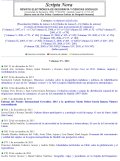Citizen participation in local agendas 21: critical questions of urban governance.
Keywords:
Local Agenda 21, environmental planning, urban governance, urban governability, citizen participationAbstract
Environmental planning such as the Local Agenda 21 (LA21) launched by United Nations in the Summit of Rio de Janeiro in 1992, has been increasingly used as a new strategy of urban governance without challenging the mainstream patterns of economic growth and representative democracy. This kind of planning focuses on sustainable issues of both cities and global spaces by means of public debate, citizen involvement and consensual agreements. Along the last decade, the European Union has supported and funded many of these planning processes based on the assumption that they will improve urban sustainability and citizen participation. Nevertheless, we think that the supposed new styles of urban governance and citizen participation implied by LA21 processes do not change substantially the pluralist and elitist ways of urban governability. What we have discovered due to the comparative analysis of two cases of successful LA21, one in Portugal and one in Spain, is that citizen participation was not so plural as expected, and had little consequences for the improvement of participatory democracy and urban sustainability. Based on in-depth interviews and documents, our assessment of these two LA21 processes also shows that local politics -such as the cycles of mobilization and the social networks around public services- and supra-local contexts -such as the ways of management conflicts and EU funds by one euroregional lobby- are relevant for explaining the apparent success of citizen participation in these two cities. Finally, we indicate several social conflicts which were disrupting the whole processes. Thus, we conclude by pointing out the methods and contexts of the actual implementation of LA21 in order to explain why, in practice, citizen participation was conducted more by the action of authorities and managers than by the citizens who were involved in such a process.Downloads
Published
2011-03-05
Issue
Section
Articles
License
Los autores que publican en esta revista están de acuerdo con los siguientes términos:
- Los autores conservan los derechos de autoría y otorgan a la revista el derecho de primera publicación, cin la obra disponible simultáneamente bajo una Licéncia de Atribución Compartir igual de Creative Commons que permite compartir la obra con terceros, siempre que estos reconozcan la autoría y la publicación inicial en esta revista.
- Los autores son libres de realizar acuerdos contractuales adicionales independientes para la distribución no exclusiva de la versió de la obra publicada en la revista (com por ejemplo la publicación en un repositorio institucional o en un libro), siempre que se reconozca la publicación inicial en esta revista.





